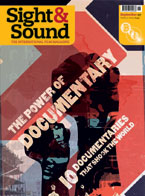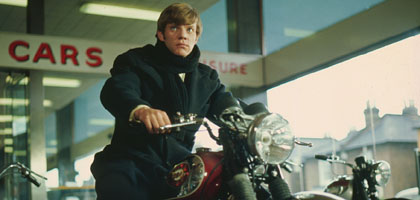
School masterly
DVD review: If....

Lindsay Anderson's seething tirade against the system is one of British cinema's true rites of passage, writes Tim Lucas
Lindsay Anderson; UK 1968; Criterion/Region 0; Aspect Ratio 1.66:1; Features: audio commentary, 2003 Scottish TV reunion of cast and crew, new video interview with actor Graham Crowden, Anderson's 1954 short 'Thursday's Children', 30-page essay/interview booklet
Winner of the Palme d'Or at the 1969 Cannes Film Festival and one of the most stimulating and visceral of all British films, Lindsay Anderson's If.... has suffered over the years from the antagonism or indifference of Paramount, its distributor. The company received the film in October 1968 and, failing to sell it to an American arthouse theatre chain, shelved it; the inability of Roger Vadim's Barbarella to lure holiday audiences, coupled with Paramount's failure to book the requisite number of British features into British theatres that year, led to If....'s emergency release one week before Christmas, a death sentence that unexpectedly attracted queues stretching a full kilometre around the block from the Paramount Plaza cinema.
Anderson delighted in the violently opposed critical response, designing a poster that presented both sides of society's heated argument under the heading "Which Side Will You Be On?" For many who were fortunate enough to see If.... on the threshold of adulthood, it became a memory to treasure (like the first time you heard Bob Dylan's 'Masters of War'), one of cinema's true rites of passage. Entire generations of teenagers have since been denied this experience by the general lack of opportunity to see the film in the video age. Before the BFI-sponsored theatrical reissue of 2002, If.... was last issued in Britain as a 1993 VHS release, before its recent Region 2 outing. In America, it has been out of circulation even longer and indeed, until the arrival of this much-needed Criterion release, was never shown there intact.
On the surface a seething but satiric tirade against the hypocrisies of the public-school system, If.... uses its setting to explore more universal issues, such as society's refusal to conduct itself in accordance with the morals it professes to hold. Scripted by David Sherwin, then 24, it introduced Malcolm McDowell and a veritable repertory company of distinguished actors (among them Arthur Lowe, Graham Crowden, Mona Washbourne) who would subsequently inhabit two further Anderson/Sherwin films headlining McDowell as wily Everyman 'Mick Travis' - O Lucky Man! (an epic jaunt through the horrors of big business, 1973) and Britannia Hospital (a semi-continuous critique of healthcare in the Thatcher years, 1982). Though If.... is more sombre than its successors, it shares with them a streak of surrealism and magic realism. This is evident in McDowell's arrival as a mysterious student with a scarf half-covering his face (when he lowers it to reveal a prophetic Zapata-like moustache, it's one of the best introductions any character - or screen actor - has ever had), continues with Travis' nightly absorption in a recording of the pulsating 'Missa Luba', gets ramped up with an afternoon of hooky that leads to an encounter with a coffee-shop girl (Christine Noonan), and ultimately explodes in a climax of machine-gunning revolution rooted in fantasy by a lack of bloodshed and the inexplicable, maternal presence of the girl.
With If...., Criterion has produced a two-disc set that can stand comparison with the finest of their multi-disc box units. The commentary, divided between McDowell and historian David Robinson, excites one to watch the film yet again. Criterion's import is being challenged by a nearly identical release from Paramount Home Entertainment UK, also available in an Amazon.co.uk exclusive edition with lobby-card reproductions and Sherwin's original script added to the slipcase. This release, however, lacks Criterion's 30-page booklet with its loving essay by critic David Ehrenstein, David Sherwin's 1960-68 diary notes, and a promotional interview Anderson conducted with himself. Furthermore, the PAL transfer hasn't the 24fps advantage of the Criterion disc, which may be essential to the proper appreciation of the film's pacing and gravitas, its impassioned incitation not to violence - but to life.
